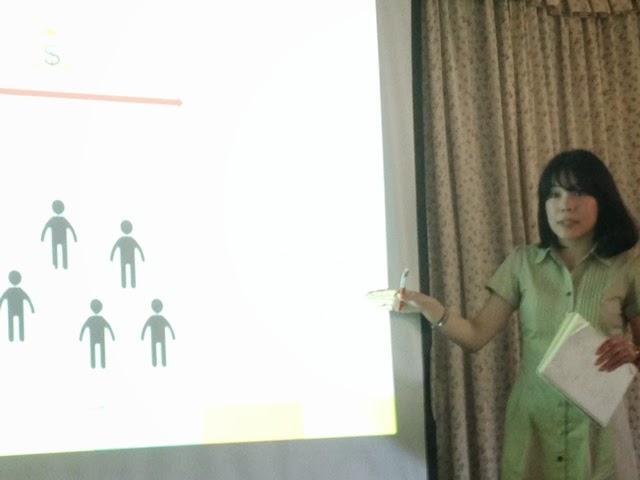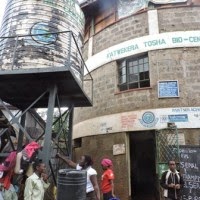Final Presentations
Students from the University of Tokyo and the University of Nairobi collaborated these past 10 days to understand life in Kibera. The students were broken into three groups, livelihoods, energy, and solid waste management. These groups have spent their time in various villages in Kibera discussing their projects with residents and local officials, taking surveys, and observing the area in order to gain a comprehensive understanding of Kibera and the aspect they are studying.
Today, all of the groups came together with community members, Umande Trust staff, and local officials to share their initial findings. After a series of introductions, and noting the importance of partnerships between universities and organizations, the groups began to share the work that they have done.
The first group that went was livelihoods and they found that there is an importance between social ties and success in entrepreneurship. For many people to be able to move to Kibera and find job opportunities, they need social ties. Marriages or friends help newcomers find a place to live or connect them with opportunities. People's networks and skills are what lead to success.
The second group researched Solid Waste Management. They noted that in Kibera solid waste is a huge problem. Their research focused on the Makina ward, which encompasses several villages. One of the first questions that they asked when talking with community members was what they define as waste. Most of the people they spoke with saw leftover food and scraps, organic items, as waste.
They also looked at the National Youth Service (NYS) projects and the effects that has on the community. Using a river, they noted that during the week while NYS was working in the area, the river was clean, but over the weekend, when NYS was not working in the area, the solid waste accumulated. This led them to wonder what will happen when the NYS project is done in the area.
The final group was the energy group. They found that in Kibera the most common fuel people use is kerosene, followed by charcoal. They found that people do not use only one source of fuel, they use at least two. One of their research questions was if alternative fuels are available why aren't people using them.
They found that people are not using the alternative fuels because they do not know about them and in some cases they are not available. Talking with community members they found people would be willing to use three types of alternative fuels; they are: briquettes, which are mixtures of charcoal and saw dust. They produce less smoke and are cheaper to buy; ethanol, which can be sold in small quantities and is affordable for people; and biogas, which is produced at Umande Trust's biocentres. If these fuels are affordable and people are made aware of them and some even requested demonstrations, people will consider switching fuel sources.
Overall, this was a very informative session for all parties. The community received research that has the potential to help improve lives and Umande Trust got feedback on their projects, and how to improve. The students also learned much from working within different villages in Kibera. As one speaker said, "We did not come to give you answers, we came to learn." This was an important learning experience for all involved and what was learned will help everyone to grow and become more successful in future endeavors.
By: Michelle Swiger
Today, all of the groups came together with community members, Umande Trust staff, and local officials to share their initial findings. After a series of introductions, and noting the importance of partnerships between universities and organizations, the groups began to share the work that they have done.
The first group that went was livelihoods and they found that there is an importance between social ties and success in entrepreneurship. For many people to be able to move to Kibera and find job opportunities, they need social ties. Marriages or friends help newcomers find a place to live or connect them with opportunities. People's networks and skills are what lead to success.
The second group researched Solid Waste Management. They noted that in Kibera solid waste is a huge problem. Their research focused on the Makina ward, which encompasses several villages. One of the first questions that they asked when talking with community members was what they define as waste. Most of the people they spoke with saw leftover food and scraps, organic items, as waste.
They also looked at the National Youth Service (NYS) projects and the effects that has on the community. Using a river, they noted that during the week while NYS was working in the area, the river was clean, but over the weekend, when NYS was not working in the area, the solid waste accumulated. This led them to wonder what will happen when the NYS project is done in the area.
The final group was the energy group. They found that in Kibera the most common fuel people use is kerosene, followed by charcoal. They found that people do not use only one source of fuel, they use at least two. One of their research questions was if alternative fuels are available why aren't people using them.
They found that people are not using the alternative fuels because they do not know about them and in some cases they are not available. Talking with community members they found people would be willing to use three types of alternative fuels; they are: briquettes, which are mixtures of charcoal and saw dust. They produce less smoke and are cheaper to buy; ethanol, which can be sold in small quantities and is affordable for people; and biogas, which is produced at Umande Trust's biocentres. If these fuels are affordable and people are made aware of them and some even requested demonstrations, people will consider switching fuel sources.
Overall, this was a very informative session for all parties. The community received research that has the potential to help improve lives and Umande Trust got feedback on their projects, and how to improve. The students also learned much from working within different villages in Kibera. As one speaker said, "We did not come to give you answers, we came to learn." This was an important learning experience for all involved and what was learned will help everyone to grow and become more successful in future endeavors.
By: Michelle Swiger







Comments
Post a Comment